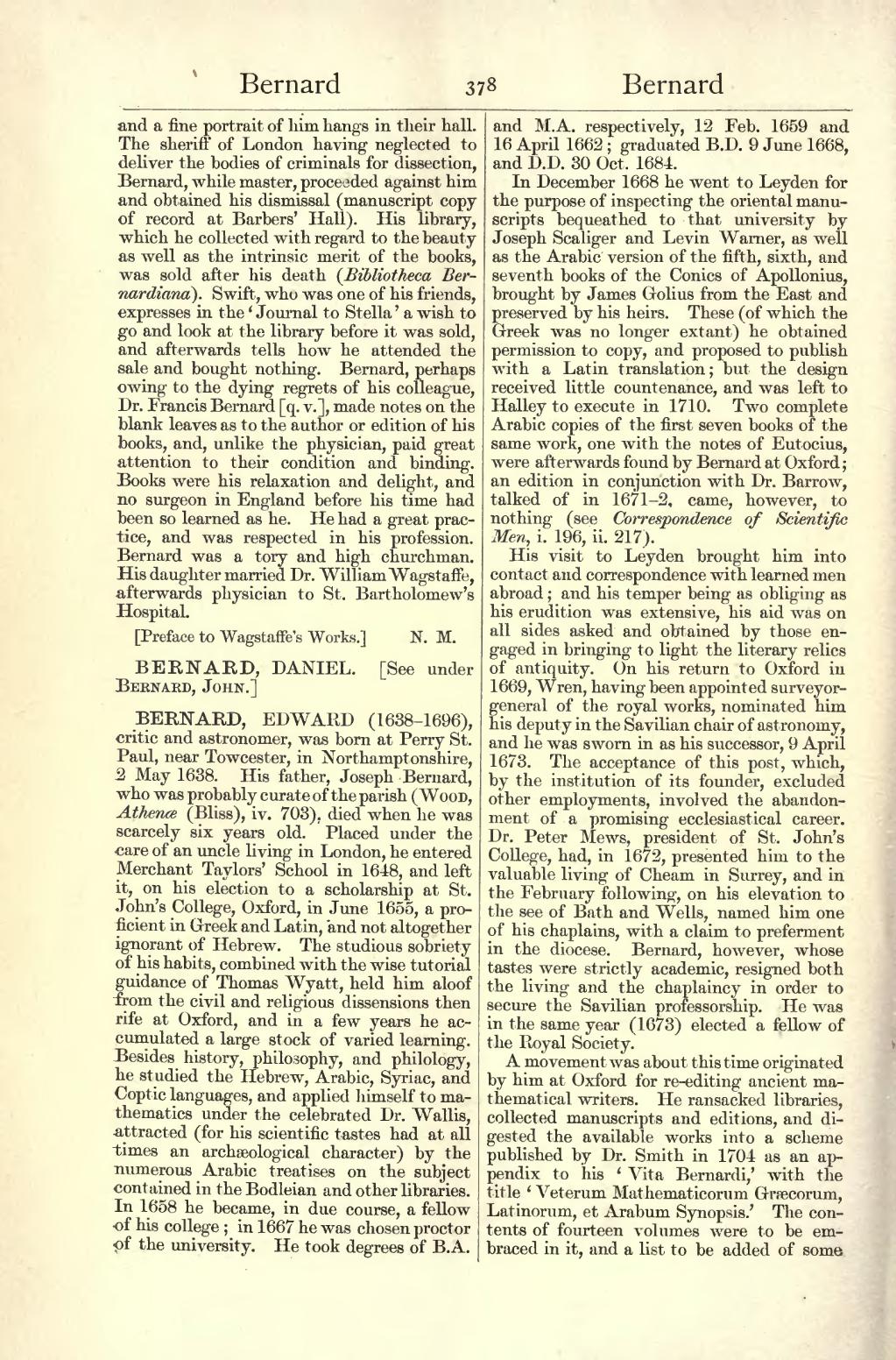and a fine portrait of him hangs in their hall. The sheriff of London having neglected to deliver the bodies of criminals for dissection, Bernard, while master, proceeded against him and obtained his dismissal (manuscript copy of record at Barbers' Hall). His library, which he collected with regard to the beauty as well as the intrinsic merit of the books, was sold after his death (Bibliotheca Bernardiana). Swift, who was one of his friends, expresses in the 'Journal to Stella' a wish to go and look at the library before it was sold, and afterwards tells how he attended the sale and bought nothing. Bernard, perhaps owing to the dying regrets of his colleague, Dr. Francis Bernard [q. v.], made notes on the blank leaves as to the author or edition of his books, and, unlike the physician, paid great attention to their condition and binding. Books were his relaxation and delight, and no surgeon in England before his time had been so learned as he. He had a great practice, and was respected in his profession. Bernard was a tory and high churchman. His daughter married Dr. William Wagstaffe, afterwards physician to St. Bartholomew's Hospital.
[Preface to Wagstaffe's Works.]
BERNARD, DANIEL. [See under Bennard, John.]
BERNARD, EDWARD (1638–1696), critic and astronomer, was born at Perry St. Paul, near Towcester, in Northamptonshire, 2 May 1638. His father, Joseph Bernard, who was probably curate of the parish (Wood, Athenæ (Bliss), iv. 703), died when he was scarcely six years old. Placed under the care of an uncle living in London, he entered Merchant Taylors' School in 1648, and left it, on his election to a scholarship at St. John's College, Oxford, in June 1600, a proficient in Greek and Latin, and not altogether ignorant of Hebrew. The studious sobriety of his habits, combined with the wise tutorial guidance of Thomas Wyatt, held him aloof from the civil and religious dissensions then rife at Oxford, and in a few years he accumulated a large stock of varied learning. Besides history, philosophy, and philology, he studied the Hebrew, Arabic, Syriac, and Coptic languages, and applied himself to mathematics under the celebrated Dr. Wallis, attracted (for his scientific tastes had at all times an archæological character) by the numerous Arabic treatises on the subject contained in the Bodleian and other libraries. In 1658 he became, in due course, a fellow of his college; in 1667 he was chosen proctor of the university. He took degrees of B.A. and M.A. respectively, 12 Feb. 1669 and 16 April 1662; graduated B.D. 9 June 1668 and D.D. 30 Oct. 1684.
In December 1668 he went to Leyden for the purpose of inspecting the oriental manor scripts bequeathed to that university by Joseph Scaliger and Levin Warner, as well as the Arabic version of the fifth, sixth, and seventh books of the Conics of Apollonius, brought by James Golius from the East and preserved by his heirs. These (of which the Greek was no longer extant) he obtained permission to copy, and proposed to publish with a Latin translation; but the design received little countenance, and was left to Halley to execute in 1710. Two complete Arabic copies of the first seven books of the same work, one with the notes of Eutocius, were afterwards found by Bernard at Oxford; an edition in conjunction with Dr. Barrow, talked of in 1671–2, came, however, to nothing (see Correspondence of Scientific Men, i. 196, ii. 217).
His visit to Leyden brought him into contact and correspondence with learned men abroad; and his temper being as obliging as his erudition was extensive, his aid was on all sides asked and obtained by those engaged in bringing to light the literary relics of antiquity. On his return to Oxford in 1669, Wren, having been appointed surveyor-general of the royal works, nominated him his deputy in the Savilian chair of astronomy, and he was sworn in as his successor, 9 April 1673. The acceptance of this post, which, by the institution of its founder, excluded other employments, involved the abandonment of a promising ecclesiastical career. Dr. Peter Mews, president of St. John's College, had, in 1672, presented him to the valuable living of Cheam in Surrey, and in the February following, on his elevation to the see of Bath and Wells, named him one of his chaplains, with a claim to preferment in the diocese. Bernard, however, whose tastes were strictly academic, resigned both the living and the chaplaincy in order to secure the Savilian professorship. He was in the same year (1673) elected a fellow of the Royal Society.
A movement was about this time originated by him at Oxford for re-editing ancient mathematical writers. He ransacked libraries, collected manuscripts and editions, and digested the available works into a schema published by Dr. Smith in 1704 as an appendix to his 'Vita Bernardi,' with the title 'Veterum Mathematicorum Græcorum, Latinorum, et Arabum Synopsis.' The contents of fourteen volumes were to be embraced in it, and a list to be added of some
